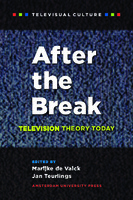After the Break
Television Theory Today
Contributor(s)
Teurlings, Jan (editor)
Valck, Marijke de (editor)
Language
EnglishAbstract
Television as we knew it is irrevocably changing. Some are gleefully announcing the death of television, others have been less sanguine but insist that television is radically changing underneath our eyes. Several excellent publications have dealt with television's uncertain condition, but few have taken the specific question of what television's transformations mean for the discipline of Television Studies as a starting point. The essays collected in this volume aim to fill this void. Two fundamental questions string the various contributions together. First, is television really in crisis or is the present not so extraordinary when revisiting television's development? Second, should we invent new theoretical concepts or are our old ones still perfectly relevant? To answer such questions the authors in this volume take up diverse case studies, ranging from the academic series Reading Contemporary Television to Flemish Fiction, from nostalgic programming on broadcast television to YouTube, from tell-sell television shows to public television art in the 1980s. Over de onzekere toestand waarin het medium televisie zich bevindt zijn verschillende publicaties verschenen, slechts weinigen hebben zich de vraag gesteld wat deze veranderingen betekenen voor de televisiewetenschap. De auteurs van After the Break gaan in op de gevolgen voor dit vakgebied. Zit het medium echt in een crisis, of is de huidige situatie helemaal niet zo bijzonder als men naar de ontwikkeling kijkt die televisie door de jaren heen heeft ondergaan? En moeten er nieuwe theoretische kaders bedacht worden om het huidige medium te beoordelen, of zijn onze oude kaders nog relevant?
Keywords
motion pictures; filmDOI
10.26530/OAPEN_445119OCN
945782586Publisher
Amsterdam University PressPublisher website
https://www.aup.nl/Publication date and place
2013Series
Televisual Culture,Classification
Films, cinema
Television


 Download
Download